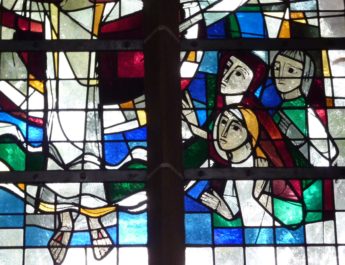Acts 18:1-4
NL 243
1 After this Paul leftI AthensII and wentIII to Corinth.IV
I “left” = chorizo. 13x in NT. From choris (apart from, separate from); from chora (space, land, region, fields, open area); from chasma (gap, gulf, chasm, open space); from chasko (to gape, yawn). Properly, this is to separate or create space. It can be literal as divide, depart, or withdraw. It can be figurative in reference to divorce.
II “Athens” = Athenai. 4x in NT. From Athene (Athena; Greek goddess of wisdom). This is Athens, said to be founded by Athena.
III “went” = erchomai. This is to come or go.
IV “Corinth” = Korinthos. 6x in NT. From “Pre-Greek Pelasgian kar (point, peak); perhaps named after Corinthos, a descendant of the god Zeus.” This is Corinth. See https://en.wiktionary.org/wiki/%CE%9A%CF%8C%CF%81%CE%B9%CE%BD%CE%B8%CE%BF%CF%82#Ancient_Greek & https://en.wikipedia.org/wiki/Ancient_Corinth
2 There he foundV a JewVI namedVII
V “found” = heurisko. This is to find, learn, or obtain. It is to discover something, which generally implies a period of searching for it. This is to find in a literal or figurative sense. This is where the word “heuristic” comes from.
VI “Jew” = Ioudaios. From Ioudas (Judah, Judas); from Hebrew Yehudah (Judah, son of Jacob, his tribal descendants, a name for the southern kingdom. Literally, it means praised); probably from yadah (to throw one’s hands into the air in a gesture of praise); from yad (hand). This is Jewish, a Jew, or Judea.
VII “named” = onoma. May be from ginosko (know, recognize, learn from firsthand experience). This is a name, authority, cause, character, fame, reputation. The name was thought to include something of the essence of the person so it was not thought to be separate from the person.
VIII “Aquila” = Akulas. 6x in NT. From Latin Aquila (Aquila); from aquila (eagle); perhaps related to aquilus (“blackish, the color of darkness”); perhaps from aqua (water). This is Aquila, meaning eagle. See https://en.wiktionary.org/wiki/Aquila
IX “Pontus” = Pontikos. 1x in NT. From Pontos (Pontus, an area adjacent to the Black Sea; perhaps meaning “sea”). This is from Pontus or related to Pontus. It means “sea.” See https://www.abarim-publications.com/Meaning/Pontus.html
X {untranslated} = genos. From ginomai (to come into being, to happen, become, be born; to emerge from one state or condition to another; this is coming into being with the sense of movement or growth). This is family, offspring, kin – in a literal or figurative sense.
who had recentlyXI comeXII from ItalyXIII with his wifeXIV Priscilla,XV
XI “recently” = prosphatos. 1x in NT. From prosphatos (freshly slain, new or recent); {from pros (at, to, toward, with) + phen- (to kill) OR from pro (before, earlier, above) + akin to sphazo (to slay, butcher an animal, maim)}. This is recently or newly.
XII “come” = erchomai. Same as “went” in v1. See note III above.
XIII “Italy” = Italia. 4x in NT. From Latin Italia (Italy); from Oscan viteliu (land of bulls”). This is Italy, meaning “land of bulls.” See https://en.wiktionary.org/wiki/Italia#Latin
XIV “wife” = gune. Related to {untranslated} in v2. Perhaps from ginomai (see note X above). This is woman, wife, or bride. This is where the word “gynecologist” comes from.
XV “Priscilla” = Priskilla. 3x in NT. From Priska (Prisca, “of earlier times.”); from Latin priscus (Priscus, a male name); from Latin priscus (ancient, former); from prae (first, earlier). This is Priscilla, it is an affectionate short form of Prisca. So, it means “little Prisca.” Prisca means “of earlier times.” See https://www.abarim-publications.com/Meaning/Prisca.html#.XsyzQmhKhPY & https://en.wiktionary.org/wiki/Prisca
because ClaudiusXVI had orderedXVII allXVIII Jews to leave Rome.XIX
XVI “Claudius” = Klaudios. 3x in NT – all in Acts. From Latin Claudius (Claudius); {from Latin claudico (to limp, waver, be lacking in something) or from Latin claudo (to enclose, close)}. This is Claudius, meaning “limp” or “enclosure” or “lame” or “safe haven” or “support” or “one to lean on.” See https://www.abarim-publications.com/Meaning/Claudius.html & https://en.wiktionary.org/wiki/Claudius#Latin
XVII “ordered” = diatasso. 16x in NT. From dia (through, across to the other side, thoroughly) + tasso (to arrange, appoint, determine). This is to arrange thoroughly, charge, appoint, give orders to. It is a command that is a proper order, given with the chain of command and so binding. This is from ancient military language.
XVIII “all” = pas. This is all or every.
XIX “Rome” = Rhome. 8x in NT. From the base of rhonnumi (to strengthen, be firm, have health; used as a salutation in letters at the end); {probably from rhoomai (to move quickly)} OR from Latin Romulus (the one who founded Rome according to legend – many scholars believe this was suggested after the fact i.e. long after Rome was called Rome) OR from Rumon or Rumen (the Tiber river); {related to Proto-Indo-European root *srew- (to flow)} OR from Etruscan ruma (teat). This is Rome. See https://en.wikipedia.org/wiki/Rome
Paul went to seeXX them, 3 and, because he wasXXI of the same trade,XXII
XX “went to see” = proserchomai. Related to “went” in v1. From pros (for, at, towards) + erchomai (see note III above). This is to approach, draw near, come up to. It is also used figuratively to mean worship.
XXI “was” = eimi. This is to be, exist.
XXII “same trade” = homotechnos. 1x in NT. From the same as homou (together); {from homos (the same)} + techne (art, craft, skill, or trade); {from tekton (craftsman; particularly one who works with wood); from the base of timoria (penalty, punishment, vengeance); from timoreo (to punish, protect honor); {perhaps from time (worth or something’s perceived value; literally, price, but figuratively, the honor or value one sees in someone or something else; also esteem or dignity; also precious or valuables); {from tino (to pay, be punished, pay a penalty or fine because of a crime); from tio (to pay respect, value) or from tikto (to produce, bring forth, beget)}}. This is having the same trade or craft.
he stayedXXIII with them, and they workedXXIV together—by tradeXXV they were tentmakers.XXVI
XXIII “stayed” = meno. This is to stay, remain, wait, await, continue, abide, endure. It can mean to literally stay in a place or to remain in a condition or to continue with hope and expectation.
XXIV “worked” = ergazomai. From ergon (work, task, action, employment). This is to work, labor, perform, toil.
XXV “trade” = techne. Related to “same trade” in v3. 3x in NT. See note XXII above.
XXVI “tentmakers” = skenopoios. 1x in NT. From skene (a tent, booth, tabernacle, dwelling – in a literal or figurative sense); {perhaps related to skeuos (vessel, tool, container, implement; also vessel in a figurative or literal sense) or perhaps related to skia (shadow, thick darkness, outline; figurative for a spiritual situation that is good or bad)} + poieo (to make, do, construct, cause). This is tentmaker.
4 EveryXXVII SabbathXXVIII he would argueXXIX
XXVII “every” = pas. Same as “all” in v2. See note XVIII above.
XXVIII “Sabbath” = sabbaton. From Hebrew shabbath (sabbath); from shabath (to rest, stop, repose, cease working; by implication, to celebrate). This is the sabbath. It can also be used as shorthand for a week i.e. the time between two sabbaths.
XXIX “argue” = dialegomai. 13x in NT. From dia (through, across to the other side, thoroughly) + lego (to speak, tell, mention)}. This is to discuss, preach, reason, argue, address, lecture.
in the synagogueXXX and would try to convinceXXXI Jews and Greeks.XXXII
XXX “synagogue” = sunagoge. From sun (with, together with, closely associated) + ago (to lead, bring, carry, guide, go, drive). Literally, this is a bringing together, a place of assembly. The term can be used for the people or for the place where they assemble. It is also sometimes used of Christian churches in the New Testament. So, this is synagogue, assembly, congregation, or church. This is where the word “synagogue” comes from.
XXXI “convince” = peitho. This is to have confidence, to urge, be persuaded, agree, assure, believe, have confidence, trust. It is the root from which the Greek word for faith is drawn (pistis).
XXXII “Greeks” = Hellen. From Hellas (Hellas, what Greeks called themselves); perhaps from helane (torch) OR from selene (moon). This is Greek, but was used for Gentiles, broader populations that spoke Greek and were a part of Greek culture regardless of their heritage. See https://en.wikipedia.org/wiki/Helen_(given_name)
Image credit: “Ave, Caesar! Io, Saturnalia!” by Sir Lawrence Alma-Tadema, 1880.




